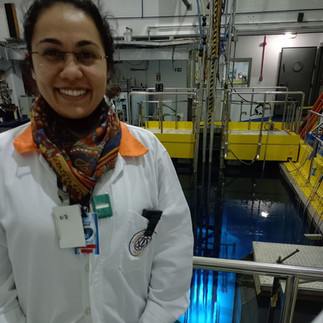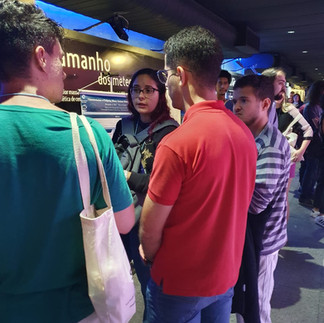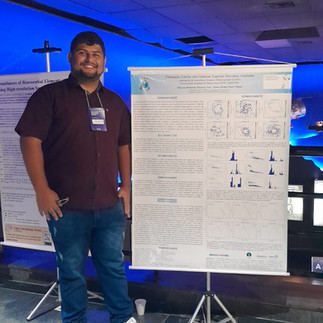Developing Scientific Thinking: Scientific Initiation as a Bridge to the Future
- Profisica UESC
- Jun 19, 2024
- 6 min read
A Scientific Initiation (IC) is an academic research project that can be undertaken by an undergraduate student, and there is also IC Júnior for high school students. This project will be developed in collaboration with a professor from the relevant field of study, who will act as the supervisor. In both cases, the student does not need to have prior knowledge in any specific area.
Toni Almeida, a master's student in the Graduate Program in Physics at UESC (PROFISICA), presented an overview of his personal experience with IC during the Física Viva Journey (PROFISICA-NIT-UESC). He attributes his success in reaching the master's level and his recent acceptance into a PhD program in Canada to his involvement in IC.
Today, November 30, at 8:00 PM, Toni's lecture will be rebroadcast on the YouTube channel of PPG PROFISICA-UESC. Check out the link and enable notifications!
Below, you can find a summary of Toni's insights and recommendations for undergraduate and high school students to evaluate whether participating in an IC is worthwhile.

Photo: Technical visit to the Pico dos Dias Observatory, Brasópolis (MG), in 2019. Author: Leandro Kerber and archive: PROFÍSICA-UESC.
What do you learn from the process of conducting an IC?
An IC is the best time to learn the fundamentals of how to do science, how to develop a research project, and understand its stages. The student will get a close-up view of what a scientist does daily and how to deal with the challenges and difficulties of pursuing this career.
This experience provides a solid foundation for the student from the beginning until they actually start working academically and professionally in their chosen field of study.
Toni shared that the research work he is doing today, in the final phase of his master's in Physics, was only possible because of what he learned during his IC. He mentioned that it was during this time he learned the most about astronomy, in his case.
How Can Scientific Initiation Be Important for Career Development?
A Scientific Initiation (IC) in Physics offers exposure to the laboratories and research lines of graduate programs. The student can choose to conduct a novel study that is not part of the standard curriculum.
Engaging in an IC provides research stimuli that are likely not encountered in a traditional undergraduate program. The student learns to present their work at scientific events, write reports, exchange ideas more closely with various professors, and interact more frequently with other students involved in IC. They also meet peers at scientific events, among other benefits of participating in a Scientific Initiation.
Photos: Graduate students from the Physics Graduate Program at UESC (PROFISICA) at academic events and technical visits to astronomy observatories and radiation and technology research centers. Source: UESC-PROFISICA archive.
Want to Start a Scientific Initiation: Now What?
There are two types of IC: voluntary and with a scholarship. In both cases, the student needs to develop a research project with objectives, a timeline, and a research plan. However, this should not be a cause for concern. The student will have the help of a professor to do this. So, the first step is to choose a professor with whom they have an affinity or who is in an area they want to pursue.
With the help of this professor, the student will define a study goal, a specific project, a study plan, and a research project.
How About Obtaining a Scholarship for IC?
Currently, the remuneration for an IC scholarship is approximately R$ 700.00 per month for a period of 12 months. According to Toni, this amount is excellent and sufficient to cover expenses for a student.
Toni also mentioned that his IC required exclusive dedication, but today, it is much more flexible, allowing the accumulation of scholarships at a national level, for example. Therefore, for those who want to dedicate themselves solely to undergraduate studies, it is an excellent path.
An IC gives a significant competitive edge to the curriculum. For instance, when applying for an exchange program or other selection processes, an IC is undoubtedly seen as a competitive advantage, as most candidates are usually highly qualified and have good grades.
With an IC, the student receives strong recommendation letters from professors and reference institutions. Therefore, doing an IC should be seen as a "plus," since not the majority of students engage in this type of project. Those who do, get ahead!
An IC indeed adds a competitive edge to the curriculum. Toni noted that when evaluating his and his colleagues' attempts to access a master's or PhD program, having one or more ICs puts a person at an advantage. A student can reach a PhD without an IC, but having one provides a very strong competitive edge; not only in terms of competing with other candidates but also in terms of handling graduate coursework.
A student who has done an IC already enters a graduate program with the basic subjects well absorbed and won't need to constantly revisit foundational knowledge, as they will already have a solid base to dedicate more time to advanced courses.
In Summary: Advantages and Challenges
Advantages of Early Participation in an IC:
Deepening Knowledge: Scientific initiation offers a deeper immersion into theoretical and practical principles, solidifying academic understanding.
Skill Development: From hypothesis formulation to data analysis, scientific initiation enhances essential skills like critical thinking, problem-solving, and teamwork.
Academic Networking: Early contact with the scientific community allows for the creation of valuable connections, opening doors to future academic and professional opportunities.
Challenges to Consider:
Time Demand: The required dedication can be intense, necessitating a balance between regular studies and research.
Uncertainty and Frustrations: The research path is not always linear; facing challenges and dealing with unexpected results are integral parts of the process.
Toni's Personal Experience with IC
Toni Almeida began his IC in 2017 and is currently, in 2023, pursuing a graduate degree in Physics at UESC (PROFISICA Master's Program), with a PhD in progress at a university in Canada.
Toni completed 4 years of IC, coinciding with the conclusion of his undergraduate studies in 2021. In the first year, he began research in astronomy focusing on photometry, where he learned the foundation for all his master's research.
4o

Foto: Toni Almeida no Colóquio da 1/2 Jornada dos Discentes 2023 do PPG em Física da UESC.
In the second year, he continued with another year of IC. This period was when he truly immersed himself in research, participating in more scientific events, for which he received financial support for travel to other cities and states. However, it was during a presentation at UESC that he met his current research advisor, the Astrophysicist and Professor in the Physics Graduate Program at UESC, PROFÍSICA, Leandro Kerber. Through this scientific partnership, Toni spent 6 months at UESC working with Professor Leandro and then continued with the final 2 years of his undergraduate studies in his IC in Astrophysics.
Photos: Dr. Leandro Kerber, Astrophysicist and Professor of the PPG PROFÍSICA-UESC, with his master's student, Toni Almeida, during a visit to the OPD Observatory, Minas Gerais, and at the Colloquium of the 1/2 Jornada of PROFÍSICA at LATO (Laboratory of Theoretical and Observational Astrophysics) at UESC.
"(...) When I started my IC in astronomy, I was in the second semester of physics. I didn't even have an advanced calculus course in the curriculum (...)," comments Toni.
Toni shared that if a student simply follows the standard flow of an undergraduate program, they won't take the initiative for activities that truly bring them closer to the world of scientific research. These activities include participating in scientific events and giving oral presentations, which offer opportunities to meet new professors, researchers, and students, creating connections and partnerships for the present and future.
An IC makes a student's curriculum more competitive both nationally and internationally. Toni mentioned that when he applied for a master's program, he competed for a spot at the Pontifical Catholic University of Chile, one of the best in the world in astronomy, and ranked in the "top 7". He attributes this achievement to his journey in scientific initiation. On the other hand, when he applied for the academic master's program in Physics at UESC, he was accepted in first place. Recently, he was also accepted into a PhD program in Canada.
Where to Find Information to Start an IC at UESC
On the UESC Graduate Studies website (PROPP), important information can be found to start a Scientific Initiation, as well as to begin one.
To further expand your knowledge on the topic, check out some freely available materials on the internet:
May these insights shared by Toni inspire young people to explore the fascinating horizons of scientific initiation.
For more information, please contact Toni and his advisor directly:
Toni Almeida - tonialmeida10@hotmail.com Dr. Leandro Kerber - lokerber@uesc.br
For more information about the graduate program in Physics at UESC:
Dr. Andre Luis Batista Ribeiro, Coordinator of the Academic Master's Program in Physics at UESC, PROFÍSICA - profisica@uesc.br
All the content shared by Toni Almeida can be viewed in his lecture presented at the 🌠 Jornada Física Viva, titled as this blog post: "Developing Scientific Thinking: Scientific Initiation as a Bridge to the Future."
Register, watch, and even receive a certificate, all free until September 2024, at: 🌐 uescprofisica.net/fisicaviva
The lecture will also be temporarily available on our YouTube channel. Check it out!
YouTube Link: https://www.youtube.com/watch?v=3JaeIOOIwAE
Source:
Content extracted from Toni Almeida's Lecture at Jornada Física Viva: "Developing Scientific Thinking: Scientific Initiation as a Bridge to the Future."
Edited by:
Flávia Vitória. ADECCUA @adeccua Consulting in Management, Communication, and Events adeccuamkt.mailchimpsites.com























Comments